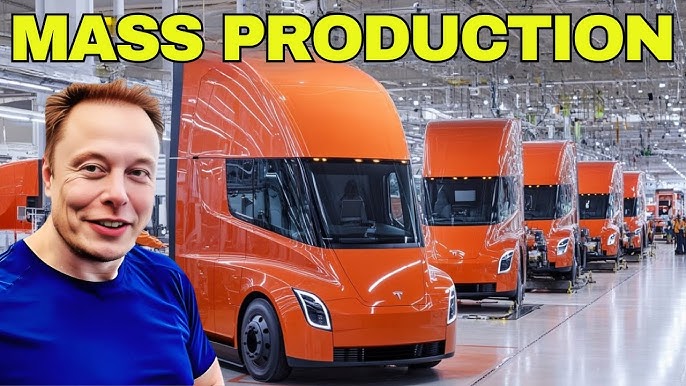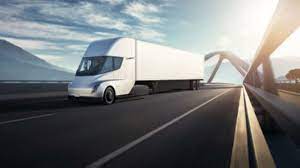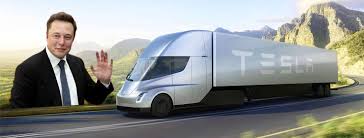Elon Musk Reveals Plans to Produce Electric Trucks in Europe

🎬 Elon Musk Reveals Plans to Produce Electric Trucks in Europe
Elon Musk has unveiled a bold new expansion strategy that promises to revolutionize the transportation industry in Europe: Tesla’s plan to produce electric trucks on the continent. This announcement marks a significant step forward in Musk’s vision to electrify the global transport sector, particularly in Europe, where there is growing demand for sustainable and eco-friendly alternatives to traditional diesel-powered trucks. With European governments increasingly focused on reducing carbon emissions and promoting green energy, Tesla’s entry into the electric truck market in Europe is set to shake up the logistics and automotive industries.
The Shift Toward Electric Trucks in Europe
Europe has long been a leader in the push for sustainable transport solutions. With strict regulations aimed at reducing carbon emissions and a commitment to achieving carbon neutrality by 2050, the continent is one of the fastest-growing markets for electric vehicles (EVs). The commercial transport sector, which relies heavily on diesel-powered trucks for long-haul delivery, has been a major contributor to pollution and greenhouse gas emissions. In response, governments across Europe are implementing stricter emission standards, offering incentives for EV adoption, and encouraging the development of charging infrastructure for electric vehicles.
Tesla’s move to produce electric trucks in Europe aligns with these goals, offering a cleaner alternative for the region’s heavy-duty vehicle sector. Musk’s announcement comes at a time when the electric truck market is gaining momentum, with Tesla’s own Semi truck—first unveiled in 2017—leading the charge. The European market presents a unique opportunity for Tesla to expand its presence, given the continent’s commitment to clean energy and the growing demand for sustainable logistics solutions.
What Tesla’s Electric Truck Production Means for Europe
The new production facility that Tesla plans to establish in Europe will be focused on manufacturing electric trucks designed to meet the specific needs of the European market. Tesla’s electric truck, the Tesla Semi, is already set to play a major role in the company’s expansion into this sector. With the European trucking industry seeking to reduce its reliance on fossil fuels, the electric Semi offers a promising solution. It features a range of up to 500 miles on a single charge, impressive acceleration, and zero emissions, making it an ideal choice for long-haul freight transport.
By manufacturing electric trucks locally in Europe, Tesla will not only meet the demand for sustainable transportation but also help reduce production costs and improve supply chain efficiency. Local production will allow Tesla to circumvent the challenges posed by import tariffs and shipping costs, making their electric trucks more affordable for European fleet operators. This move also demonstrates Tesla’s commitment to supporting the European economy by creating jobs and boosting local manufacturing capabilities.
Moreover, Tesla’s new production facility will contribute to the development of a robust electric vehicle ecosystem in Europe. By building electric trucks in the region, Tesla will be able to collaborate with local suppliers, strengthen the EV supply chain, and support the growth of charging infrastructure. This will provide fleet operators with the tools they need to adopt electric vehicles at scale, helping to overcome one of the key challenges facing the EV market: the lack of widespread and accessible charging stations.
The Impact on the Trucking Industry and the Environment
Tesla’s electric trucks could have a profound impact on both the trucking industry and the environment. The commercial trucking sector is one of the largest sources of greenhouse gas emissions in Europe, contributing significantly to air pollution and climate change. By replacing diesel trucks with electric alternatives, Tesla’s entry into the market could dramatically reduce the carbon footprint of the transportation sector. The environmental benefits of electric trucks are undeniable, with the potential to lower emissions, improve air quality, and contribute to Europe’s broader climate goals.
For the trucking industry, Tesla’s electric trucks offer a compelling business case. The cost savings from fuel efficiency and lower maintenance needs could make electric trucks more cost-effective in the long run compared to their diesel counterparts. Tesla’s Semi is designed with lower maintenance costs in mind, thanks to its simpler electric drivetrain, which has fewer moving parts than traditional internal combustion engines. As a result, fleet operators can expect fewer breakdowns, reduced downtime, and lower service costs.
Moreover, Tesla’s electric trucks offer superior performance characteristics that could redefine the logistics industry. The Semi’s ability to accelerate quickly and carry heavy loads without sacrificing range or efficiency could change the way goods are transported across Europe. This could lead to improved delivery times and greater flexibility for fleet operators, allowing them to meet the increasing demands of e-commerce and consumer expectations for faster deliveries.
What to Expect in the Future: A Greener Europe with Electric Trucks
Tesla’s plans to produce electric trucks in Europe is just the beginning of a broader transformation in the region’s transportation sector. As Tesla ramps up production and begins to deliver electric trucks to fleet operators, we can expect to see significant shifts in how goods are transported across Europe. With governments offering incentives for the adoption of electric vehicles and businesses increasingly prioritizing sustainability, the demand for electric trucks is likely to rise.
In the coming years, Tesla will continue to refine its electric truck offerings, making them more affordable and accessible to businesses of all sizes. The company’s ambitious vision for a fully sustainable transportation system, combined with its cutting-edge technology and expertise in electric vehicles, positions it as a leader in the global transition to electric mobility.
As the electric truck market grows, Tesla’s efforts will likely encourage other manufacturers to follow suit, leading to greater competition and innovation in the industry. The shift toward electric trucks in Europe could serve as a model for other regions, spurring similar developments in North America, Asia, and beyond. With Tesla at the forefront of this transformation, the future of freight transport is bound to be cleaner, more efficient, and more sustainable.









